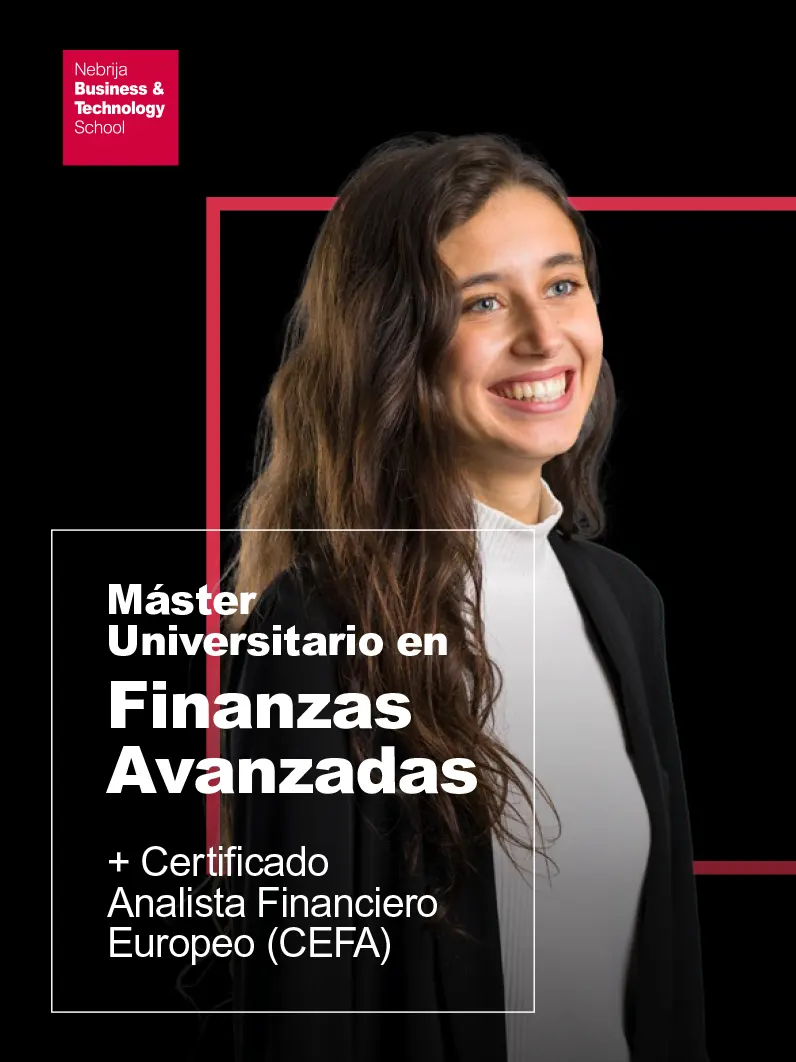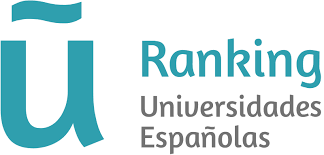(60 ECTS credits)
Accredited by EFFAS and recognized by European regulators
An innovative, specialized master's degree, developed in collaboration with the Financial Studies Foundation (FEF), offers rigorous training in Finance. This internationally recognized program grants students the CEFA (Certified European Financial Analyst) certification upon successful completion of program subjects and the defense of their Master's Final Research Project (TFM). CEFA is an internationally recognized professional certification awarded by EFFAS (European Federation of Financial Analysts Societies). It assesses a comprehensive range of banking and financial competencies essential for financial analysis, advisory services, and portfolio and investment management.
Why study the Master's Degree in Finance + Certified European Financial Analyst (CEFA) qualification?
- This specialized and innovative Master's program, developed in collaboration with the Financial Studies Foundation (FEF), offers a professionally challenging experience and delivers comprehensive training in Finance.
- It is an internationally recognized program, where participants automatically receive the prestigious CEFA (Certified European Financial Analyst) certification.
- This qualification is acknowledged by the CNMV (Comisión Nacional del Mercado de Valores) as meeting the training requirements mandated by MIFID II for carrying out information and advisory tasks for clients.
- The CEFA certification holds recognition from the British FSSC/FSA (Financial Services Skills Council / Financial Service Authority) and authorizes professionals to engage in seven series of financial market activities in the United Kingdom.
- The CEFA certification is also validated in countries where regulators require it for financial analyst practice, including Portugal, Greece, Malta, Argentina, and Brazil, among others.
- The program is endorsed by EFFAS (European Federation of Financial Analysts Societies).
- As part of this program, there is an optional intensive week of international training, facilitating valuable international networking opportunities.
- Situated in Madrid, our location provides a unique advantage, offering direct access to major financial institutions and companies, including those in consulting and investment banking. Industry leaders regularly visit our campus to share their insights, participate in selection processes, and conduct on-campus presentations.
"The Master's Degree in Finance caters to the needs of recent university graduates and early-career professionals seeking to advance their careers with international prospects in financial analysis, asset and investment management, corporate finance, and financial asset organization and intermediation. This program equips students to excel in a dynamic international landscape.

Director of the Master’s Degree in Advanced Finance
During in-person sessions, participants experience a blend of theoretical classes and practical insights from the financial industry. This approach equips them with a robust foundation in international finance principles, analytical tools, and the ability to make well-informed decisions in a rapidly evolving world. Furthermore, students are required to complete a final professional master's project, which they will present and defend before a tribunal. These projects will be overseen by a dedicated project director.
Upon successful completion of examinations, students are conferred with a dual degree: the Master's Degree in Finance from Nebrija University, and the Certified European Financial Analyst (CEFA) certification by the European Federation of Financial Analyst Societies (EFFAS).
As an added benefit, students gain access to various informative events hosted by the Spanish Institute of Analysts, many of which are offered free of charge. These events include conferences, colloquiums, financial meetings, and the annual EFFAS Summer School, organized by EFFAS".
Program
The Master’s Degree in Advanced Finance offers the following Specializations:
- Compulsory Subjects
- 4 ECTS | Financial markets, regulation and sustainability
- 3 ECTS | Economic analysis and finance
- 3 ECTS | Corporate finance
- 6 ECTS | Accounting analysis and modeling
- 4 ECTS | Quantitative methods and programming applied to finance
- 4 ECTS | Asset and portfolio management
Specialization Subjects- 3 ECTS | Management control and reporting
- 3 ECTS | Corporate investments
- 3 ECTS | International Corporate Finance
- 3 ECTS | Project & Trade Finance
- 3 ECTS | Investment Analysis and Decisions
- 3 ECTS | Investment Strategies
- 3 ECTS | Data Extraction, Transformation and Loading (SQL) in Finance
- 3 ECTS | Financial Data and Visualization Techniques
- Compulsory Subjects
- 3 ECTS | Debt capital markets and Equity capital markets (DCM & ECM)
- 3 ECTS | Business valuation
- 6 ECTS | Financial derivatives and risk management
- 6 ECTS | Master's Final Research Project
Specialization Subjects- 3 ECTS | Advanced financial analysis and project financing
- 3 ECTS | Taxation and financial statements
- 6 ECTS | Professional internship
- 3 ECTS | Mergers, Buyouts, and Corporate Restructurings
- 3 ECTS | Leveraged Finance
- 6 ECTS | Professional internship
- 3 ECTS | Derivatives, Alternative Investments, Cryptocurrencies
- 3 ECTS | Advanced Investment Portfolio Management
- 6 ECTS | Professional internship
- 3 ECTS | Digital Finance (I): (Cloud & Blockchain and Finance)
- 3 ECTS | Digital Finance (II): Machine Learning, AI, and Finance
- 6 ECTS | Professional internship
Subjects - Specializations
- Specialization I: Financial Management 18 ECTS credits
3 ECTS | Management control and reporting. (1er)
Throughout the course, students will explore primary management control and business reporting systems, which include: internal management information for decision-making: comprising cost accounting and management accounting; Financial planning, involving long-term financial planning and budget management; Business management control, covering control principles, control instruments, and functional control (e.g., for commercial activities, investments, and financial management); Reporting, which includes result presentation, deviation analysis, and the use of a balanced scorecard.
3 ECTS | Corporate investments . (1er)
This subject primarily delves into the assessment of capital structure sizing and composition, as well as the understanding of specific off-balance sheet structures. Additionally, it covers various financing models, extends risk concepts applicable to investment projects, and offers students a comprehensive perspective. The approach is rooted in a reasoned and critical outlook, emphasizing the practical application of knowledge acquired throughout the program.
3 ECTS | Advanced financial analysis and project financing. (2do)
Participants develop the ability to assess common fixed-income and variable-income financial products, along with some derivatives. To achieve this objective, they conduct a comprehensive examination of the role of financial products within a company's liabilities and an investor's assets. The techniques for their valuation are thoroughly explored, with a particular focus on credit risk analysis and the structure of financial debt, which are central in today's financial landscape. Furthermore, we provide theoretical and practical analysis of primary self-financing instruments, encompassing both long and short-term bank financing options such as loans, credits, commercial discounts, factoring, forfaiting, confirming, leasing, renting, and other specialized financing alternatives that support business activities.
3 ECTS | Taxation and financial statements . (2do)
The course aims to provide an extensive understanding of the various taxes related to financial operations, with a particular focus on a detailed examination of the tax implications in corporate tax concerning corporate financing operations.
6 ECTS | Professional Internship (2do)
- Especialidad II: Corporate & Investment Banking (English)18 ECTS credits
3 ECTS | International Corporate Finance. (1er)
This course covers financial management multinational corporations (MNCs), companies that operate businesses in international environments and markets, and that use international financial markets. Foreign operations and international financial markets provide MNCs management with new opportunities and new constrains. Corporate goal at MNCs continues being to maximize the value of the firm, but MNCs financial management requires additional analysis and techniques to manage these new business opportunities and risks. Course topics will include: Understanding financial management in international business. International accounting, disclosure and financial analysis. Foreign exchange risk: measurement and management of FX exposure. International investment decisions: capital budget, greenfield investment, cross-border M&A. International financing decisions: MNCs capital structure, MNCs WACC, subsidies funding. International cash management: TSC, cash pooling, international netting, global banking. Management control and reporting at MNCs. International transfer pricing policy and tax exposure.
3 ECTS | Proyect & Trade Finance. (1er)
Long-term financing of capital investment projects based on projected cash flow. The course concentrates on the practical aspects of project finance, the most frequently used financial technique for financing infrastructure projects and one of the investment asset classes growing the most from the point of view of investors’ asset allocation. The course will provide students both with the analytical skills and the practical tools to identify the different sources of risk of a project, to design a network of contracts to manage them, and to assess the project viability from a financial point of view. During the program participants will learn how to analyze and structure a complex project finance transaction, identifying the key elements of a project, and the optimal way of financing it. The program will provide participants with real-life cases, examples, practical managerial tools and frameworks on the formulation and implementation of project finance. The course will also analyze the basic tools in legal, financing and risk areas to achieve an international project with the maximum percentage of success. The student will gain a greater understanding of the international trade and, by extension, of the situation of world markets during the course. The ultimate objective is to equip students with a set of tools that will allow them to better analyze in their future professional life the social, economic and political characteristics of different countries, and how to approach them to make adequate business decisions. Some of the topics of the program are: Gain an overview of international trade financing. Understand the key risks in trade financing and measures to mitigate risks. Learn the key features and applications of essential documentation and methods of payment. Know the mechanism and applications of documentary collection and documentary credit. Discuss key differences of documentary collections and documentary credits. Structure working capital lines to meet clients’ trade finance requirements.
3 ECTS | Mergers, Buyouts, and Corporate Restructurings. (2do)
This course discusses various issues involved in mergers and acquisitions. It begins by discussing the methods of valuing a target firm. It then deals with various forms of acquiring a target firm. Finally, strategies for the acquirer and those for the target firm (defensive strategies) are discussed. The course includes different aspects like valuation issues, motives for mergers, forms of acquisitions (take overs, LBO, MBO, MBI...), and the different strategies (aggressive and defensive).
3 ECTS | Leveraged Finance. (2do)
During this course we introduce to the Debt Capital Markets (DCM) and how to help companies to raise debt in the markets. We analyze the different purposes for issuers and to appeal to different types of investors. We also analyze the main categories of bonds: investment-grade bonds, high-yield bonds, government bonds, emerging markets bonds, convertible bonds, covered bonds and asset backed bonds.
6 ECTS | Prácticas Empresariales. (2do)
- Specialization III: Analysis and Investments 18 ECTS credits
3 ECTS | Investment Analysis and Decisions. (1er)
On one hand, the course covers technical analysis, encompassing chartism and technical indicators. It involves analyzing financial market movements through the study of price and volume graphs. This section explains the fundamental principles behind key chart patterns, providing step-by-step guidance and formulating investment strategies aimed at enhancing investment returns. On the other hand, the course delves into technical indicators, which are mathematical formulas represented graphically. These indicators attempt to correlate asset movements with potential future shifts, enabling the analysis of prevailing trends. The primary objective of the fundamental analysis section is to equip students with the knowledge and tools required to analyze a publicly traded company. This portion explores various company valuation methods and the qualitative aspects considered when making recommendations about publicly traded firms. It also covers the connection between economic and financial conditions and stock market valuations.
3 ECTS | Investment Strategies. (1er)
This subject equips participants with the knowledge and tools needed to create a financial plan tailored to each type of investor. It covers all aspects of financial planning, starting from profiling the investor to designing an investment plan, resulting in the preparation of a portfolio suited to each profile. The course also delves into how to monitor investments, conduct periodic reviews, and assess results from a highly practical perspective. Additionally, the subject addresses ethics in financial advice and explores MiFID regulations, which establish standards of conduct governing the actions of investment companies. These standards aim to ensure that services provided to clients are characterized by honesty, impartiality, and professionalism.
3 ECTS | Derivatives, Alternative Investments, Cryptocurrencies. (2do)
. The subject's objective is to familiarize participants with technology-driven financial activities, enabling them to acquire the specific knowledge required to implement investment strategies encompassing both traditional and alternative assets, such as cryptocurrencies and commodities.
3 ECTS | Advanced Investment Portfolio Management. (2do)
. The course covers the management of institutional portfolios, with an emphasis on the significance of asset allocation. It also delves into the study of hedge funds, which represent the realm of alternative management. This includes an examination of the primary investment styles, strategies, reference indices, and the utilization of technical analysis as a tool for analyzing quantitative trading strategies.
6 ECTS | Professional Internship (2do)
- Specialization IV: Data Analysis and Finance18 ECTS credits
3 ECTS | Data Extraction, Transformation and Loading (SQL) in Finance. (1er)
This module introduces participants to the principles, practices, and data analysis approaches employed in the field of finance. It covers algorithms and statistical models used to facilitate financial analysis and decision-making across various industries and functions. The subject is tailored for individuals with diverse backgrounds and previous training, aiming to familiarize them with relational databases and the SQL language.
3 ECTS | Financial Data and Visualization Techniques. (1er)
Throughout the course, participants work with various visualization tools to create tailored presentations and reports for different audiences. These tools enable the integration of information from diverse sources, link it, automate processes, and align it with management criteria.
3 ECTS | Digital Finance (I): (Cloud & Blockchain and Finance). (2do)
The course delves into the examination of primary business models emerging in the financial market due to the digitalization of the economy. Participants analyze the key instruments and technologies to gain insights into a company's competitive positioning within the context of digital transformation processes in the financial sector. Additionally, they become acquainted with the principal digital components of planning, programming, and controlling financing scenarios.
3 ECTS | Digital Finance (II): Machine Learning, AI, and Finance. (2do)
This subject cultivates participants' data analysis and comprehension skills for making business decisions through artificial intelligence systems, specifically machine learning. From a practical and applied standpoint, participants become acquainted with supervised learning and data classification techniques. They also explore statistical concepts and algorithms that aim to identify behavioral patterns and processes, enabling trend inference and predictions within the realm of finance.
6 ECTS | Professional Internship
Professors

Director of the Double Bachelor's Degree in Journalism + International Relations.
EFFAS President and FEF School Director. PhD in Business Administration and Management from the San Pablo CEU University

Corporate Finance Professor
PhD in Economics from the Complutense University of Madrid

Professor of Financial Derivatives
PhD in Economics and Finance from the Autonomous University of Madrid

Professor of Asset and Portfolio Management
Investment manager and fund selector at Mapfre Gestión Patrimonial

Professor of Financial Markets, Debt Capital Markets and Equity Capital Markets
Private banking investment manager at Ibercaja

Professor of Quantitative Methods
Private Banker at Adbank

Professor of Quantitative Methods
Private Wealth Manager at Creand Wealth Management (CEFA)

Professor of Business Valuation
Director de Análisis en Lighthouse

Professor of Asset and Portfolio Management
Investment Manager at Mapfre Asset Management
Competences
The primary objective of this program is to provide a consistent and high-level training that ensures decision-making competence for professionals in the fields of analysis, financial management, investment, and portfolio management, while adhering to the ethical standards of the profession.
Upon completing the program, students will have gained the knowledge, skills, and tools necessary to:
- Understand recent economic events, identifying the various phases of the economic cycle and their relationship with financial markets.
- Analyze a company's financial statements and comprehend the different variables to consider for effective company management and financial direction within specific economic sectors.
- Grasp the fundamentals of corporate finance and the critical aspects of company valuation.
- Comprehend financial instruments, their valuation methods, and how they are traded in financial markets.
- Identify the key aspects of portfolio management, including the primary performance ratios for appropriate securities portfolio valuation.
- Acquire the skills for effective risk management, exploring available instruments and strategies.
- Understand the current regulatory landscape of European financial markets and the role of ethics in global financial markets.
- Analyze various ESG (Environmental, Social, and Governance) strategies and their integration into different stages of the investment process.
- Gain insights into data management challenges and the development of digital finance, including the contribution of artificial intelligence to the investment process.
Employability and Internships
Career Opportunities
Graduates of the master's degree will be equipped to assume key roles in the following sectors/departments:
- Investment Banking: Departments of Financial Studies and Analysis, Treasury and Capital Markets, Business Finance, Structured Financing, Design and Issuance of Securities, Mergers and Acquisitions, Project Financing, Private Equity, and more.
- Asset and Portfolio Management: Roles in Risk and Asset Management, Analysis and Measurement of Results, Private Banking, and more.
- Investment Management and Consulting.
- Accounting and Auditing.
- Investor Relations and Client Management.
- Specialized Journalists in Financial Information.
- University students looking to launch or develop their professional careers in portfolio and investment management.
Student profile
This Master's program is designed for recent graduates, preferably in fields such as business administration, economics, marketing, accounting, and tourism. It also welcomes young professionals who are currently working in or aspire to work in financial markets, financial analysis, and portfolio management.
Admission criteria
In the initial stage of our admissions process, our department will assess whether you meet the following essential requirements for enrollment in this Master's Degree program:
- You have a university degree, bachelor's degree or equivalent qualification.
- You speak Spanish fluently. In the personal interview it will be verified that the student has the level of Spanish necessary to successfully complete the program. It is recommended that candidates have a B2 (CEFR) level of English, as the program may include materials or conferences in this language.
After confirming compliance with these minimum requirements, each candidate's application will be evaluated based on the following criteria:
- Candidate’s academic transcript (30%).
- Structure personal interview (60%). Candidate suitability will be evaluated based on their experience, knowledge, technical and professional skills relevant to the intended studies. Motivation, attitudes, and other personal aspects contributing to their successful adjustment to the chosen program will also be assessed.
- Candidate’s presentation document (10%). In a personal document, the candidate will express their motivation and interest in the requested studies, along with any other relevant personal circumstances for the selection process.
Admission process
1. Submit the following documents to the admissions department:
- Completed admission application
- Valid identification document
- Official Spanish university diploma, or receipt thereof / Official diploma issued by a foreign higher education institution belonging to the EHEA / Official diploma issued in a foreign system not belonging to the EHEA and homologated.
- A passport-sized photograph
- Updated Curriculum Vitae
- Motivation letter
2. Pre-admission
3. Personal interview
We will reach out to schedule a personal or online interview with the academic director. During this interview, we will evaluate your profile and expectations as a student of the Double Bachelor's Degree in Journalism + International Relations.
4. Notification to the candidate of the final resolution
5. Enrollment
Our self-enrollment service on the Nebrija website enables admitted students to complete all academic, financial, and administrative procedures within the specified deadlines. Upon receiving your admission letter, you will also receive the access code and personal password required for self-enrollment. Once self-enrollment is completed, you will officially become a student of Nebrija Business & Technology School.
Financing
We are dedicated to assisting you in exploring financing options and opportunities, enabling you to make the best investment in your career and future.
For more information on scholarships available to postgraduate students, please refer to the following link or contact us through the provided email addresses:






